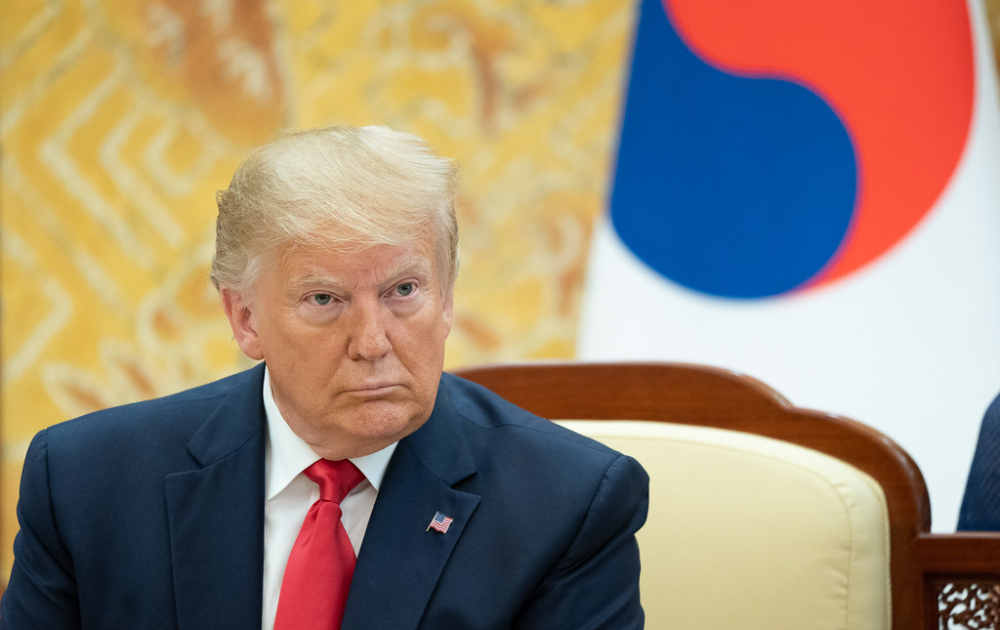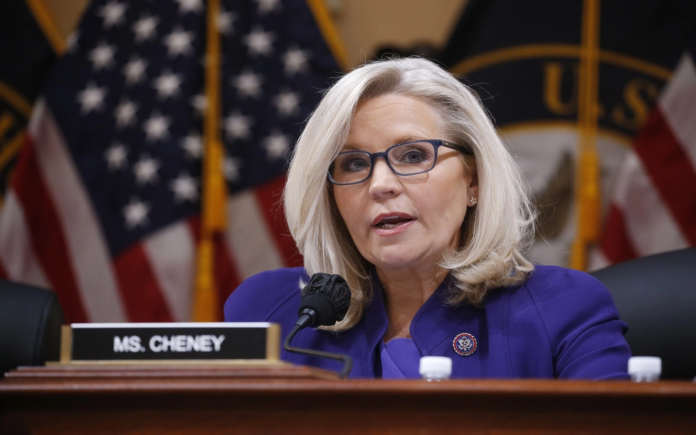Former U. S President Donald Trump’s recent comments targeting Liz Cheney have sparked controversy and debate. In a bold response, Liz Cheney labeled Trump as a “small, vengeful, and unstable” figure, accusing him of using his influence to silence critics and threaten political opponents. Cheney’s statement sheds light on Trump’s treatment of his “enemies” and raises concerns about the tone and direction of his campaign rhetoric.
Liz Cheney’s Fierce Response to Trump’s “War Hawk” Remark
On Friday, Liz Cheney, a former U. S representative from Wyoming and a well-known Republican critic of Trump, reacted sharply to Trump’s recent remarks. Trump had referred to Cheney as a “war hawk” at a rally, a term generally used to describe someone who aggressively advocates for military action. Cheney, however, took this comment to heart, interpreting it as more than mere rhetoric.
Cheney did not hold back in her response, describing Trump as a “dictator” figure and warning of potential threats against those who dare to speak against him. Her reaction reflects her deep concerns over what she perceives as a threat to American democratic values, especially given Trump’s growing influence within the Republican Party.
The heated exchange between Trump and Liz Cheney
During a rally in Arizona, Trump criticized Cheney, even calling her “dumb” and labeling her a “war hawk.” His comments extended to her father, former Vice President Dick Cheney, who has also been openly critical of Trump. Trump suggested, in an incendiary tone, that if Cheney were put in a dangerous situation, she would quickly change her views. “Imagine her standing there with a rifle pointed at her, nine barrels ready to fire—let’s see how she feels then,” he reportedly remarked.

This statement, delivered in a rally setting, quickly became a point of contention on social media, especially when Trump’s tone seemed to imply more than just a metaphorical attack. These comments have raised questions about the language Trump uses in his campaign rallies and the broader implications it might have on his supporters.
Liz Cheney’s Accusations: Trump as a Threat to Democracy
Liz Cheney took to social media, sharing her thoughts on what she perceives as Trump’s dangerous behavior. She wrote, “This is how dictators destroy free nations. They threaten to kill anyone who opposes them. We cannot entrust our country and our freedom to a small, vengeful, unstable person.” Her statement reflects a long-standing concern she has voiced repeatedly: that Trump’s actions and rhetoric are undermining the core principles of American democracy.
Liz Cheney’s stance also aligns with her previous criticisms of Trump, particularly regarding his role in the events of January 6, 2021. As a prominent member of the House committee that investigated the Capitol insurrection, Cheney consistently warned about the dangers of Trump’s influence, painting him as a figure willing to do anything to retain power—even if it means encouraging violence against political opponents.
Trump’s Team Responds
Following the uproar caused by Trump’s comments, his campaign team quickly moved to clarify his intentions. Carolyn Levitt, a spokesperson for Trump, responded by downplaying the remarks, saying that Trump’s comments about Liz Cheney were intended to criticize her pro-war stance, not as a literal threat.
Levitt stated, “President Trump is absolutely right in highlighting that ‘war hawks’ like Liz Cheney are always quick to start wars and send other Americans to fight. This is just another example of fake media drumming up controversy.” The Trump campaign has often argued that the media deliberately misconstrues his statements to sway public opinion against him, especially in the lead-up to the elections.
The Broader Impact on American Politics
This latest exchange between Trump and Cheney highlights the growing divide within the Republican Party. While Trump maintains a strong following among his supporters, Cheney represents a faction of Republicans who remain wary of Trump’s influence and approach. Her public opposition to Trump has isolated her from much of her party but has also made her a prominent figure among those who believe Trump’s tactics are harmful to American democratic institutions.
Many political analysts see Cheney’s stance as a reflection of the deep-seated concerns within the GOP. Her public criticisms underscore the tensions between Trump’s supporters, who see him as a champion against establishment politics, and those who fear his influence as a risk to democracy. Before this event, Mark Cuban was commented by Trump, now this event adding fuel to American Politics.
The Importance of Civil Discourse in Modern Politics
The debate between Liz Cheney and Trump
The debate between Liz Cheney and Trump also raises larger questions about the role of language and rhetoric in politics. With the stakes so high and emotions running deep, political figures are being urged to consider the impact of their words. Trump’s comments, whether intended as hyperbole or not, have intensified the call for responsible political speech.Political analysts have voiced concerns that extreme rhetoric could inspire hostile or even violent actions, particularly when aimed at prominent figures like Liz Cheney. Given the rise of politically motivated violence, it is essential for leaders to use caution in their language and set a tone that encourages civil discourse rather than hostility.
Conclusion
As the 2024 elections approach, the exchange between Trump and Liz Cheney is a reminder of the critical issues at stake. Liz Cheney’s unwavering stance against Trump highlights a broader struggle for the soul of the Republican Party. For some, she represents a voice of reason calling for accountability; For others, she is a symbol of resistance against a popular leader within her own party.
Ultimately, this debate reflects not only a political divide but also differing visions for America’s future. Will the Republican Party choose a path of moderation, or will it continue to follow the fiery rhetoric of figures like Trump? The answers to these questions could shape the direction of American politics for years to come.

Happy holidays from Iowa, Winston here. I’m always watching to see what newer sites are going up and I just wanted to see if you would like an extra hand with getting some targeted traffic, create custom AI bots to answer questions from visitors on your site or walk them through a solution of any sort or even a sales process/funnel. I can even create a custom persona of yourself, custom videos/images/adcopy, remove negative listings, the list goes on. I’ll even shoulder 90% of the costs, dedicating my time and tools that I’ve created myself and bought over the years. I’ve been doing this for over 22 years, helped thousands of people and have loved every minute of it.
There’s virtually no cost on my end to do any of this for you except for my time starting at 99 a month. I don’t mean to impose; I was just curious if I could lend a hand.
Brief history, I’ve been working from home for a couple decades now and I love helping others. I’m married, have three girls and if I can provide for them by helping you and giving back by using the tools and knowledge I’ve built and learned over the years, I can’t think of a better win-win.
It amazes me that no one else is helping others quite like I do and I’d love to show you how I can help out. So, if you need any extra help in any way, please let me know either way as I value your time and don’t want to pester you.
PS – If I didn’t mention something you might need help with just ask, I only mentioned a handful of things to keep this brief 🙂
All the best,
Winston
Cell – 1-319-435-1790
My Site (w/Live Chat) – https://cutt.ly/bec4xzTQ